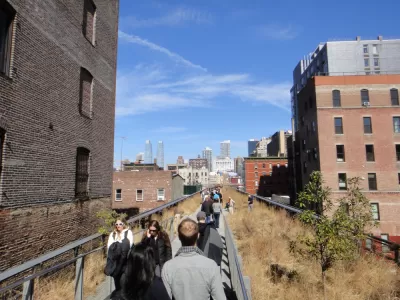A plan included in New York Gov. Andre Cuomo's draft 2022 budget will make it easier to do adaptive reuse for new housing in New York City.

"For the next five years, certain New York City building owners may be able to get around some local zoning rules to convert properties to residential use," reports Kathryn Brenzel.
If enacted, owners of hotels with fewer than 150 rooms, other forms of temporary lodging, and class B and C office buildings in Midtown could "avoid local zoning restrictions related to light and air requirements for residential conversions," according to Brenzel. The ability to avoid zoning restrictions would contingent on commitments to set aside 20 percent of the new housing units as affordable, or as supportive housing.
Valerie Campbell, a partner at Kramer Levin who focuses on land use issues, is quoted in the article predicting that the proposed incentives would make it much easier and faster to complete adaptive reuse projects in New York.
More details on the geographic limitations of the incentives and the history of similar incentives for adaptive reuse in the state are included in the source article.
Declining demand for office space as a result of the pandemic is fueling the move to make it easier to convert hotel and office uses to residential, as predicted in an article by Edie Small for the same publication in March 2020.
FULL STORY: State proposes zoning override for commercial-to-resi conversions

Maui's Vacation Rental Debate Turns Ugly
Verbal attacks, misinformation campaigns and fistfights plague a high-stakes debate to convert thousands of vacation rentals into long-term housing.

Planetizen Federal Action Tracker
A weekly monitor of how Trump’s orders and actions are impacting planners and planning in America.

In Urban Planning, AI Prompting Could be the New Design Thinking
Creativity has long been key to great urban design. What if we see AI as our new creative partner?

King County Supportive Housing Program Offers Hope for Unhoused Residents
The county is taking a ‘Housing First’ approach that prioritizes getting people into housing, then offering wraparound supportive services.

Researchers Use AI to Get Clearer Picture of US Housing
Analysts are using artificial intelligence to supercharge their research by allowing them to comb through data faster. Though these AI tools can be error prone, they save time and housing researchers are optimistic about the future.

Making Shared Micromobility More Inclusive
Cities and shared mobility system operators can do more to include people with disabilities in planning and operations, per a new report.
Urban Design for Planners 1: Software Tools
This six-course series explores essential urban design concepts using open source software and equips planners with the tools they need to participate fully in the urban design process.
Planning for Universal Design
Learn the tools for implementing Universal Design in planning regulations.
planning NEXT
Appalachian Highlands Housing Partners
Mpact (founded as Rail~Volution)
City of Camden Redevelopment Agency
City of Astoria
City of Portland
City of Laramie





























